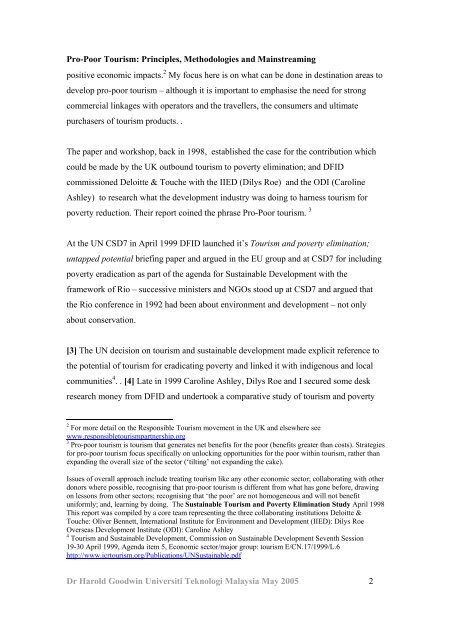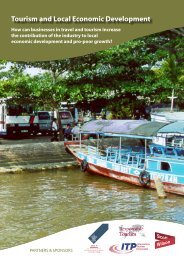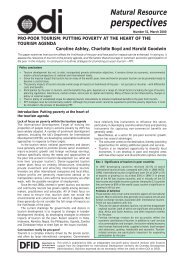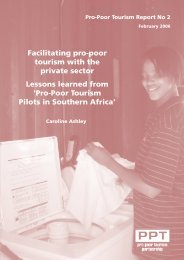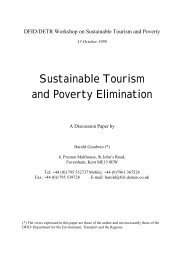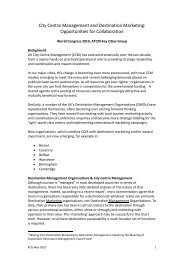Pro-Poor Tourism: Principles, Methodologies and ... - Harold Goodwin
Pro-Poor Tourism: Principles, Methodologies and ... - Harold Goodwin
Pro-Poor Tourism: Principles, Methodologies and ... - Harold Goodwin
Create successful ePaper yourself
Turn your PDF publications into a flip-book with our unique Google optimized e-Paper software.
<strong>Pro</strong>-<strong>Poor</strong> <strong>Tourism</strong>: <strong>Principles</strong>, <strong>Methodologies</strong> <strong>and</strong> Mainstreamingpositive economic impacts. 2 My focus here is on what can be done in destination areas todevelop pro-poor tourism – although it is important to emphasise the need for strongcommercial linkages with operators <strong>and</strong> the travellers, the consumers <strong>and</strong> ultimatepurchasers of tourism products. .The paper <strong>and</strong> workshop, back in 1998, established the case for the contribution whichcould be made by the UK outbound tourism to poverty elimination; <strong>and</strong> DFIDcommissioned Deloitte & Touche with the IIED (Dilys Roe) <strong>and</strong> the ODI (CarolineAshley) to research what the development industry was doing to harness tourism forpoverty reduction. Their report coined the phrase <strong>Pro</strong>-<strong>Poor</strong> tourism. 3At the UN CSD7 in April 1999 DFID launched it’s <strong>Tourism</strong> <strong>and</strong> poverty elimination;untapped potential briefing paper <strong>and</strong> argued in the EU group <strong>and</strong> at CSD7 for includingpoverty eradication as part of the agenda for Sustainable Development with theframework of Rio – successive ministers <strong>and</strong> NGOs stood up at CSD7 <strong>and</strong> argued thatthe Rio conference in 1992 had been about environment <strong>and</strong> development – not onlyabout conservation.[3] The UN decision on tourism <strong>and</strong> sustainable development made explicit reference tothe potential of tourism for eradicating poverty <strong>and</strong> linked it with indigenous <strong>and</strong> localcommunities 4 . . [4] Late in 1999 Caroline Ashley, Dilys Roe <strong>and</strong> I secured some deskresearch money from DFID <strong>and</strong> undertook a comparative study of tourism <strong>and</strong> poverty2 For more detail on the Responsible <strong>Tourism</strong> movement in the UK <strong>and</strong> elsewhere seewww.responsibletourismpartnership.org3 <strong>Pro</strong>-poor tourism is tourism that generates net benefits for the poor (benefits greater than costs). Strategiesfor pro-poor tourism focus specifically on unlocking opportunities for the poor within tourism, rather thanexp<strong>and</strong>ing the overall size of the sector (‘tilting’ not exp<strong>and</strong>ing the cake).Issues of overall approach include treating tourism like any other economic sector; collaborating with otherdonors where possible, recognising that pro-poor tourism is different from what has gone before, drawingon lessons from other sectors; recognising that ‘the poor’ are not homogeneous <strong>and</strong> will not benefituniformly; <strong>and</strong>, learning by doing. The Sustainable <strong>Tourism</strong> <strong>and</strong> Poverty Elimination Study April 1998This report was compiled by a core team representing the three collaborating institutions Deloitte &Touche: Oliver Bennett, International Institute for Environment <strong>and</strong> Development (IIED): Dilys RoeOverseas Development Institute (ODI): Caroline Ashley4 <strong>Tourism</strong> <strong>and</strong> Sustainable Development, Commission on Sustainable Development Seventh Session19-30 April 1999, Agenda item 5, Economic sector/major group: tourism E/CN.17/1999/L.6http://www.icrtourism.org/Publications/UNSustainable.pdfDr <strong>Harold</strong> <strong>Goodwin</strong> Universiti Teknologi Malaysia May 2005 2


